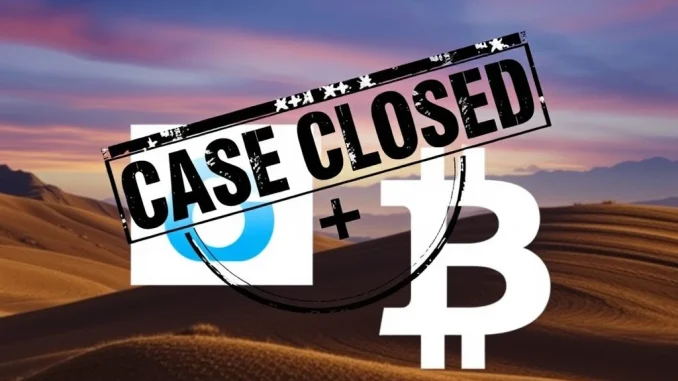
In a significant development in the crypto legal landscape, BiT Global, a Hong Kong-based cryptocurrency exchange with backing from TRON founder Justin Sun, has reportedly dropped its lawsuit against major US exchange Coinbase. The legal action, initiated last December, stemmed from Coinbase’s decision to delist wBTC (Wrapped Bitcoin).
What Led to the Coinbase and BiT Global Dispute?
The core of the legal conflict originated from Coinbase’s move to remove wBTC from its trading platform. While the specific reasons cited by Coinbase for the delisting weren’t immediately detailed in the initial reports of the lawsuit, exchange delistings typically occur for various reasons, including low trading volume, regulatory concerns, or issues with the underlying asset or project.
BiT Global’s lawsuit, filed in December, suggested disagreement or perceived harm caused by Coinbase’s action. As an exchange itself, BiT Global might have had positions, trading pairs, or users affected by wBTC’s removal from one of the world’s largest exchanges. The involvement of Justin Sun, a prominent and often controversial figure in the crypto space, added another layer of interest to the case.
Understanding wBTC: Wrapped Bitcoin on Other Chains
To grasp the context of the delisting and subsequent Coinbase lawsuit, it’s important to understand wBTC. wBTC is an ERC-20 token on the Ethereum blockchain (and now other chains) that is backed 1:1 by Bitcoin. Its primary purpose is to bring Bitcoin liquidity into decentralized finance (DeFi) protocols that operate on networks like Ethereum, which Bitcoin’s native blockchain doesn’t support directly.
Key aspects of wBTC:
- It’s managed by a consortium of custodians and merchants.
- Each wBTC token is supposedly verifiable as being backed by one real Bitcoin held in reserve.
- It allows Bitcoin holders to participate in Ethereum-based DeFi activities like lending, borrowing, and yield farming without selling their BTC.
Delisting wBTC impacts its accessibility and perceived legitimacy on a major platform like Coinbase, potentially affecting its trading volume and utility for users.
Why Did BiT Global Drop the Crypto Lawsuit?
The report indicates that BiT Global simply dropped the lawsuit, but the reasons behind this decision are not publicly detailed. Several possibilities exist:
- Settlement: The parties may have reached an out-of-court settlement, the terms of which are confidential.
- Strategic Re-evaluation: BiT Global or Justin Sun‘s legal team may have re-evaluated the strength of their case or the potential costs and benefits of continuing litigation.
- Lack of Legal Standing/Merit: The lawsuit may have faced challenges regarding legal standing or the substantive merit of the claims against Coinbase’s business decision to delist an asset.
- Resolution of Underlying Issues: Perhaps issues related to wBTC or the delisting criteria were clarified or resolved in discussions outside of court.
Without official statements from either party, the exact motivation remains speculative.
Implications for Coinbase, BiT Global, and the Market
The dropping of the lawsuit has several potential implications:
- For Coinbase: It removes a legal challenge, saving time and resources that would have been spent on litigation. It reinforces the exchange’s discretion in listing and delisting assets based on its internal policies and risk assessments.
- For BiT Global and Justin Sun: It marks the end of a public legal battle against a major competitor. The outcome, while not a court victory, could still be tied to an agreement or a strategic shift.
- For wBTC: The delisting by Coinbase still stands, which impacts wBTC’s presence on that specific platform. However, the end of the lawsuit removes one layer of negative news associated with the asset and the delisting event itself.
- For the Broader Market: It highlights the potential for disputes between crypto entities over business decisions like delisting. However, the resolution (dropping the suit) suggests that such conflicts may be resolved without lengthy public court battles.
What Does This Mean for Exchange Operations?
Exchange operations, including listing and delisting assets, are critical functions that impact liquidity, user access, and perceived legitimacy. Delisting decisions are often based on criteria such as:
- Regulatory compliance and risk
- Trading volume and liquidity
- Project development and health
- Security vulnerabilities
- Market manipulation concerns
While exchanges typically reserve the right to delist assets at their discretion, such actions can sometimes lead to friction, especially when significant assets or powerful entities are involved, as seen with the Coinbase lawsuit from BiT Global.
The Role of Justin Sun in the Crypto Ecosystem
Justin Sun‘s involvement through BiT Global is notable. Sun is a highly visible figure, known for founding TRON and his active participation (and sometimes controversial actions) in the crypto space. His backing of BiT Global positions it as an exchange with potentially significant resources and influence. His decision, or the decision of entities he backs, to pursue and then drop a crypto lawsuit against a giant like Coinbase is a reminder of the interconnectedness and potential for conflict among major players.
Conclusion: A Quiet End to a Notable Crypto Dispute
The decision by BiT Global to drop its lawsuit against Coinbase over the wBTC delisting brings a quiet end to a potentially significant legal clash in the cryptocurrency industry. While the exact reasons for dropping the suit remain undisclosed, the outcome means Coinbase is no longer facing this specific legal challenge related to its asset management decisions. This event underscores the complexities of asset listings and delistings on major exchanges and the potential for disputes among market participants, even if those disputes don’t always proceed to a full legal battle.



